#bouboulina
Text
ROUND TWO
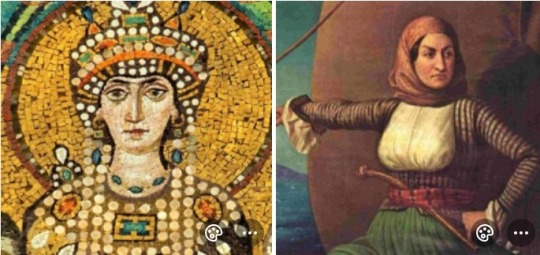
Theodora was a Byzantine empress and Justinian's wife, acting at one of his advisors. She held an important role during the Nika riots.
Laskarina Bouboulina was Greek naval commander and heroine of the Greek War of Independence (1821). Considered the first woman in Greece to gain the rank of admiral
26 notes
·
View notes
Text
12 works, PORTRAIT OF A LADY, Bouboulina, the Heroine naval captain during Greece's War of Independence, with Footnotes #212
Eugène Delacroix (1798–1863)La Grèce sur les ruines de Missolonghi/ Greece on the Ruins of Missolonghi, c. 1826Oil on canvas Edit this at Wikidataheight: 208 cm (81.8 in); width: 147 cm (57.8 in)Musée des Beaux-Arts de Bordeaux
The defeat of the Greek insurgents at Missolonghi which fell on April 29, 1826 at the hands of the Turks. The news of the fall of the most powerful fortress of Greece…
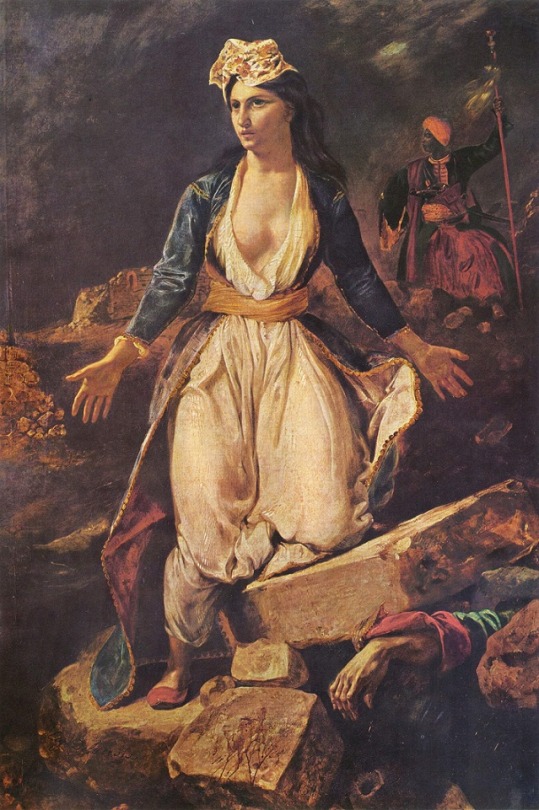
View On WordPress
#Art#Artists#Biography#Bouboulina#Colorful#Feminine#Fine Art#footnotes#Greece#History#Independence#Painting#PORTRAITOFALADY#war#Woman#Zaidan
0 notes
Text
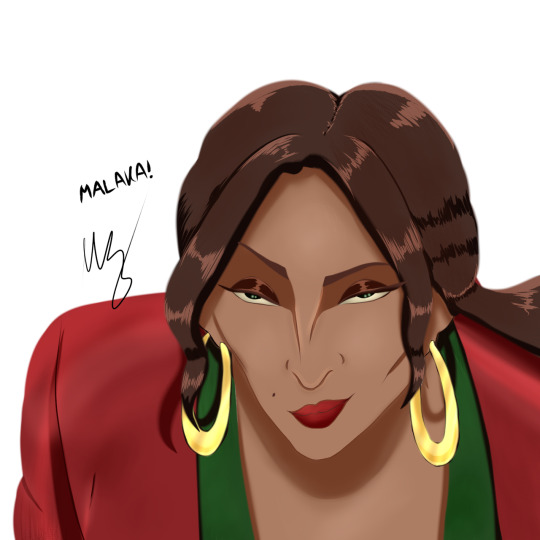
Laskarina Bouboulina from Zafara (2012).
3 notes
·
View notes
Text
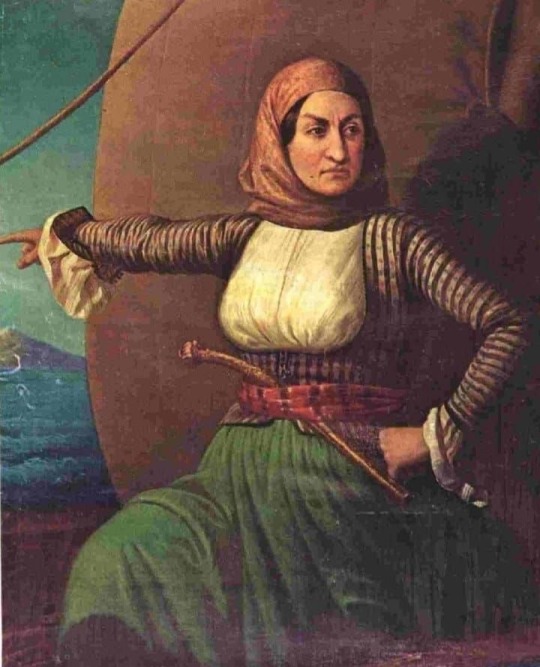
Laskarina Bouboulina — NHM, Athens
A few days after her death, a Russian delegation presented her with the honorary rank of Admiral of the Russian Navy, granted by Tsar Alexander I of Russia, making her the first woman in world naval history to hold this title.
2 notes
·
View notes
Text
When I was like twelve I really wanted to learn how to sail so my mom enrolled me in this summer camp. It was two weeks of straight torture (društvo prijateljev mladine more like društvo sovražnikov mladine). I also learnt I was really afraid of deep water and got really nervous if there were any wind (kinda essential for sailing)
1 note
·
View note
Photo
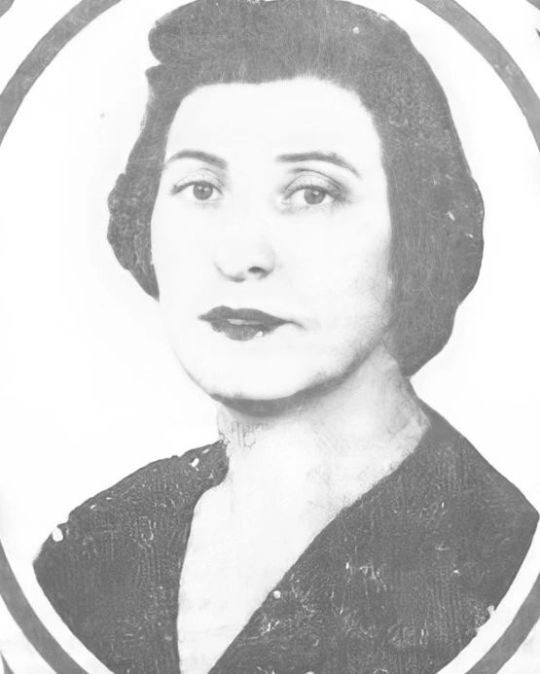
On this day, 8 September 1944, Lela Carayannis, Greek grandmother and leader of the resistance/intelligence organisation known as 'Bouboulina' was shot along with 71 of her followers and co-workers by Nazi execution squad in what is now the Diomideios Garden: the Botanical Garden now in the grounds of the University of Athens. The event came to be known as the Chaidari Massacre. https://www.facebook.com/workingclasshistory/photos/a.1819457841572691/2077648512420288/?type=3
88 notes
·
View notes
Note
Which greek hero (or heroine) of the Greek War of Independence you find underrated, in a sense we don't hear about them as often as some other familiar names, like Kolokotronis, Karaiskakis, Androutsos, Mavrogenou, Bouboulina and countless others I don't have the patience to list?
Ypsilantis, but I mean Demetrios, not Alexander. Demetrios is not well known or he is only known as the little brother of Alexander and for his engagement to Manto Mavrogenous, but he was far more than that. In my opinion, he is way more significant than his brother or at least more successful at what he set out to do.
Demetrios Ypsilantis (1793 - 1832) was a Greek prince, born in Constantinople, and serving as a military officer in the Imperial Russian Army. Ypsilantis was trained in the military schools of France.
After his brother Alexander became the leader of the Filiki Eteria (Society of Friends), the organisation of Greek expats who was conspiring for the Greek Revolution, and made some wrong choices and the rebellion in the Danubian Prinicipalities failed, he was held confined for several years and couldn't come to Greece to join the cause he was the leader of. Hence he sent Demetrios in his place, under full secrecy. Demetrios had to escape many witnesses, obstacles and dangers in order to arrive to Greece. He also went to Odessa first, gathering money from Greek expats there for the cause. He also mortgaged a lot of his own fortune and heirlooms for the cause.
As soon as he arrived to the Peloponnese, he assumed the role of the leader of the revolution and he befriended Kolokotronis, Papaflessas and Anagnostarás. Other war captains weren't very appreciative of him but with his peaceful and reconciling spirit, he managed to be accepted by most. Demetrios didn't have the image of a leader or military officer, he was only 27 year old, balding and of a small and fragile stature.
Demetrios was actually in charge of the Siege of Tripolitsá. However he had to leave as the Turkish army was attempting to reach the Corinthian Gulf and he had to confront them, so the massacre in Tripolitsá broke out in his absence. As soon as he learnt of the bloodshed, he quickly returned to Tripolitsá, ended the atrocities and actually provided refuge to Turkish or other Muslim civilians in danger.
He defended Nafplion against the huge forces of Dramali Mahmud Pasha (~30,000 men) with a tiny garrison of 700 men! Demetrios lasted for 12 days and then the garrison was dissolved. However, these 12 invaluable days gave Kolokotronis the opportunity to prepare his army, take hold of critical positions in the Peloponnese and of course burn the crops. This led to the Battle of Dervenakia against Kolokotronis, in which Dramali lost ~24,000 of his men.
While he was elected leader of the National Assembly, Demetrios refused to take sides in the infighting between the war captains and the intellectuals - this made him less powerful but also earned everyone's respect. He was adamant that all Greeks should fight united.
His biggest success was his second defense of Nafplion alongside General Yannis Makriyannis in the Battle of the Lerna Mills, this time against Ibrahim Pasha of Egypt. Here are the stats in wiki:
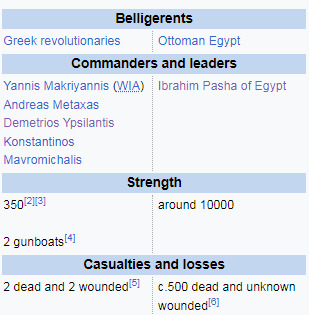
Once Greece became an independent state, Governor Ioannis Kapodistrias appointed Demetrios as the General Commader of the troops in Eastern Greece. In this position, he gave several victorious battles against the Turks in Boeotia, most notably including the Battle of Petra, on 25 September 1829, which was the official ending of the active operations of the Greek War of Independence. So, Demetrios completed the war his brother started!
Demetrios was in love and engaged with fellow heroine Mantó Mavrogenous. Ioannis Kolettis, a politician and the forefather of corruption in Greek politics already, fearing that such a marriage between two wealthy heroes could have enormous influence over the Greek populace, defamed Mantó relentlessly to Demetrios. Demetrios was swayed and broke up with her, breaking her heart.

Again, despite his bravery, Yspilantis was frail and prone to illnesses. He died young, at the age of 39, due to illness. Some speculate it might have been some form of muscular dystrophy but nothing is certain. In his funeral, Georgios Tertsetis said "He chose to sacrifice everything for his country, without ever allowing hatred to cast a shadow in his soul". Historian Konstantinos Vaskalopoulos called Ypsilantis as "the potentially purest and most selfless of the captains of the Greek War of Independence".
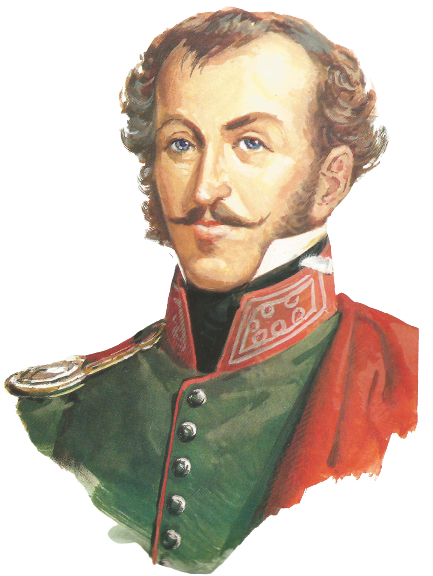
#greece#history#greek history#greek revolution#greeks#greek war of independence#demetrios ypsilantis#greek people#modern greek history#ask#attichoney4u
27 notes
·
View notes
Note
What really sucks is how, while many Greek Jews have been here for literally centuries, and even for the ones that came later on, still, our traditions are so heavily linked with the standard Greek traditions (Purim which is our Apokries, has been transferred for a long time, two weeks earlier and is celebrated during the Christian Apokries instead of the standard)and it sucks that people still claim that "jews are not truly Greeks" and how we don't belong here. Sadly I have been hearing that rhetoric even more lately to the point that I don't mention that I'm Jewish to people I don't know well, in case they are weirdos. And the way that the government is going (far right with the Spartans and everything) I don't see the situation getting better soon.
What's your opinion on this theitsa;
Hello! :) First of all, thank you for entrusting me with your thoughts! It means a lot!
It irks me when I hear "they don't belong here" about people who have been citizens of this country for a very long time! (it irks me regardless, but whatever) What the fuck "belong" even means?? And who the fuck decides that?? They are here, they are citizens, they are part of the Greek history, the end! Even more so if these people speak Greek, they have Greek education, they live the Greek reality every day, they fight for the same things as the rest of the Greeks, and so on.
It sucks that this country makes you feel like you have to hide, or explain yourself in case they learn you are Jewish. This shouldn't have to happen! And, to be fair, no one is 100% "pure" Greek (I hate the concept of purity but I mention it here for argument's sake). We all have at least ONE ancestor of Slavic (/Arvanite), German, Turk, Egyptian, Hebrew, Armenian, Persian etc descent. We don't live in a bubble! Markos Botsaris (+ his crew) and Laskarina Bouboulina were Arvanites!
For this reason, I think "How Greek" one is, shouldn't define how much respect they get as Greek citizens. We are all enclosed in the same borders under a common government and we will achieve shit if we give in to infighting about who is The Best.
At the same time, I don't mean to diminish your argument about Jewish Greeks having Greek cultural elements. It makes sense that Jews in Norway and Jews in Greece won't have the exact same culture, and that they will be affected by the culture around them. I imagine it's hurtful when this part of your identity is overlooked. I'm just saying that all people here are "allowed" to be here, since our law has allowed it.
I wish I could tell you "don't be afraid! go forth and be yourself!" but realistically you will be the judge of what's safer for you. At least from my perspective, most Greeks won't have an issue. They might be very interested, even. But one or two times there will be Greeks who will create an issue for you. And these bigoted Greeks might be even more than we think.
The "funny" thing about far-right parties like the Spartans is that, while they claim to be "for Greece", they seem to parrot USAmerican rhetoric (non-Greek rhetoric) which goes against how the locals historically viewed the Jews in Greece.
Correct me if I am wrong, anon, but I feel like the rise of antisemitism in our days is very connected to the US-Americanization of Greece? This type of antisemitism (the type of conspiracies) and the intensity is the exact same I see from people in the US who worry when Jews are in positions of power.
Now, it's a historical truth that certain Greeks worked with the Nazis for power, at the time Greece was under Nazi/Axis occupation. (The Greeks still hate these families that were Germanophille at the time, because these families also worked against the interests of the rest of Greeks) So antisemitic sentiments existed before. But the land of what is now Greece was under the Ottoman Empire for centuries and the Ottoman Empire was a haven for Jews who were heavily discriminated against and killed in West Europe.
Many Jews acquired power and influence in big Greek cities like Thessaloniki, owning factories, businesses, newspapers, and real estate. They were allowed to prosper and they were an important part of our societies. (The Byzantine Museum of Thessaloniki has an exhibition this year about the Thessalonian Jewish community. It's outside and left of the cafeteria, they have a new room)
At the same time, obviously, being Jewish didn't make you automatically rich and influential. Before the second world war, there were Greeks and Turks, and French who were very rich and influential, too. Traditionally the Greeks understood this was a Class thing, not an Ethnicity thing. (And, in any case, no people deserve a freaking genocide!!!) But my point is, in the Old Times I didn't see sentiments such as "oooo the Jews are here to control us!!" whereas I feel this is a big part of the Greek antisemitic rhetoric today.
The reason I think this sentiment is brought by the US is that in the US there are many Jewish communities and many have acquired wealth or they had generational wealth. But in Greece there as soooo few Jews and they don't hold the same amount of wealth. Like, the bigoted conspiracies of the far right don't even make sense in the Greek reality 😂
For those who don't know: Despite the efforts of Greek Jews to escape the holocaust and the efforts of many Greeks to help them escape in the Επαρχία (rest of the country, outside of Athens), like in Zakynthos, an extremely large number of Jews in Greece got killed by the Axis powers in the Second World War. Hence, the large Jewish population of Greece has dwindled, and the community is really small nowadays. The community (at least in Thessaloniki) is also cautious to open their culture to other Greeks because they fear antisemitic sentiments might hurt them again. (Which is understandable to me. Btw I heard this cause a friend writing her thesis needed access to the Hebrew records in Thessaloniki)
Sorry for the long response, anon! My thoughts were many, as you can see. I would be very happy if you could tell us more things about Greek Jewish culture, if you don't mind! (how it's similar or dissimilar to the more frequent version of Greek culture) I could not find many things online, or even in museums, about it and I am genuinely curious.
Feel free to correct me on historical stuff, if you have different info! I am sure we would all be better for learning it because so much culture and historical perspective was lost from the collective average Greek consciousness with the holocaust. I hate that this gap gave rise to the rhetoric of far-right parties. I would also like to be more equipped to speak against their antisemitism by knowing more facts.
I also wonder if it's any awkward celebrating Hanukkah as a Greek Jew? 😅 I think it's not awkward (because the Greek Seleucid Empire was a looong time ago), but I am really curious if the Greek Jews think some way about it.
#greek jewish#romaniote#<- anon might not identify with this but I'd like someone to also find this post while looking for Jews in Greece#so it's just for convenience purposes#answered
14 notes
·
View notes
Text
My cousin's dog is named Boubou and I keep calling her Bouboulina and every time it reminds me that Bouboulina is the winner of the Greek sexywoman/iconic woman polls
7 notes
·
View notes
Text
Uncover the five top things to do on the secret island getaway that celebrities don't want you to know about.
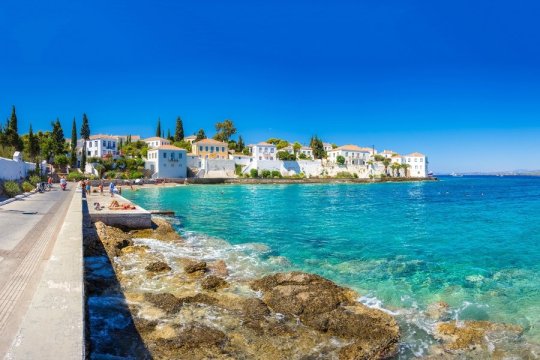
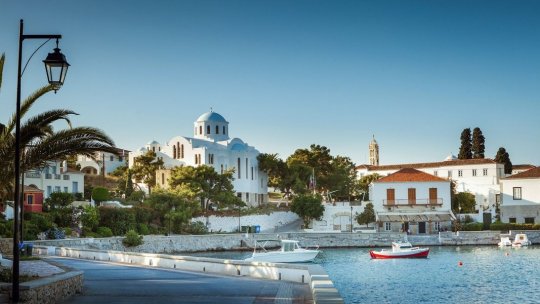

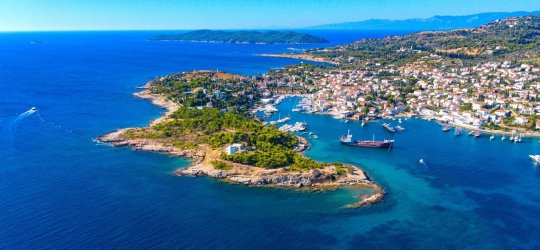
Nestled in the Saronic Gulf, Spetses is a short distance from Athens and close to other picturesque islands like Hydra and Poros. It's a haven of tranquillity where you can truly escape from the hustle and bustle of everyday life. It's
This island gem is also famous for producing the most exquisite almond sweets, so without further ado, let me give you a taste of the top 5 things to do and see in Spetses.
Explore the Old Harbour: The heart and soul of Spetses, the Old Harbour is brimming with charm and character. Wander the narrow, cobbled streets and admire the traditional architecture of the elegant mansions. Grab a coffee at one of the quaint waterfront cafes and watch the world go by.
2. Visit the Bouboulina Museum: This fascinating museum is dedicated to the heroine Laskarina Bouboulina, who played a significant role in the Greek War of Independence. Discover her incredible story and more.
3. Relax on Agia Marina Beach: A trip to Spetses would only be complete with some beach time, and Agia Marina is the perfect spot to soak up the sun. The crystal-clear water is ideal for swimming, and there are plenty of sun loungers and umbrellas for a relaxing day at the beach.
4. Take a scenic bike ride: With its relatively flat terrain and stunning coastal paths, Spetses is perfect for exploring by bike. Rent a bicycle or e-bike and enjoy a leisurely ride around the island. Stopping at hidden coves and charming villages along the way, it's a fantastic way to immerse yourself in the island's natural beauty.
5. Join a traditional Greek cooking class: What better way to immerse yourself in local culture than learning how to create mouth-watering Greek dishes? Participate in a cooking class and discover the secrets behind classic recipes like moussaka and souvlaki.
#goexploregreece#greece#travel#mustvisit#mustsee#beautiful views#spetses#saronic#thingstodo#things to do#greek island#greek islands#travel tips#travel destinations#europe#holiday#vacation#travelblogger#tuesday
6 notes
·
View notes
Text
And the ultimate winner of the greek sexy/iconic woman™ is
Laskarina Bouboulina
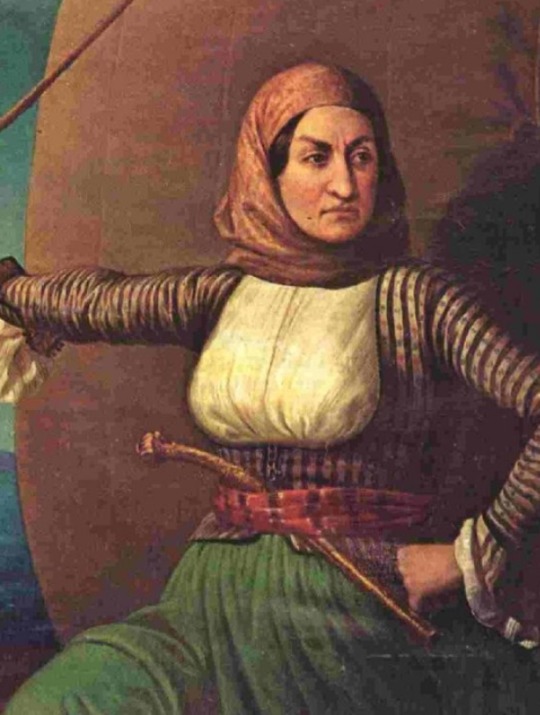
Thank you all for participating <3
#greek sexywoman poll#greek sexywomen of tumblr#greek iconicwomen#that was wild didn't expect her to win but she is an icon what can i say <3
162 notes
·
View notes
Text
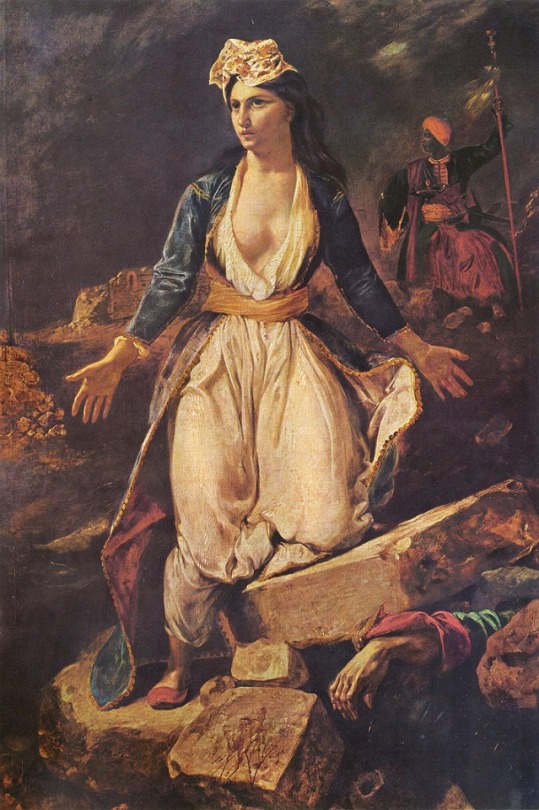
The defeat of the Greek insurgents at Missolonghi which fell on April 29, 1826 at the hands of the Turks. The news of the fall of the most powerful fortress of Greece mobilized the Philhellenes of Western Europe and revived sympathy for the Greeks…
Please follow link for full post
Greece,Bouboulina,Independence,War,PORTRAITOFALADY, painting, Zaidan, Art, biography, Artists, History, FOOTNOTES, Woman, Colorful, Feminine, fine art,
12 works, PORTRAIT OF A LADY, Bouboulina, the Heroine naval captain during Greece's War of Independence, with Footnotes #212
#PORTRAITOFALADY#painting#Zaidan#Art#biography#Artists#History#FOOTNOTE#Woman#Colorful#Feminine#fineart
0 notes
Text
LASKARINA BOUBOULINA // NAVAL COMMANDER
“She was a Greek naval commander, heroine of the Greek War of Independence in 1821, and considered perhaps the first woman to attain the rank of admiral. During her youth she developed an interest in sailing which was facilitated by her stepfather’s liberal attitude to education. She was widowed twice, inheriting a considerable sum of money from her second husband. She later allegedly joined the Filiki Etaireia secret society which sought to achieve Greek independence from the Ottoman Empire, being among the few women to do so. Following the outbreak of the Greek War of Independence, she commanded a fleet of Spetsiot ships which contributed to several campaigns most notably the siege of Nafplion. Following the defeat of her faction in the Greek civil war in 1824, she was briefly imprisoned and expelled to Spetses. She was killed in 1825 during the course of a family feud.”
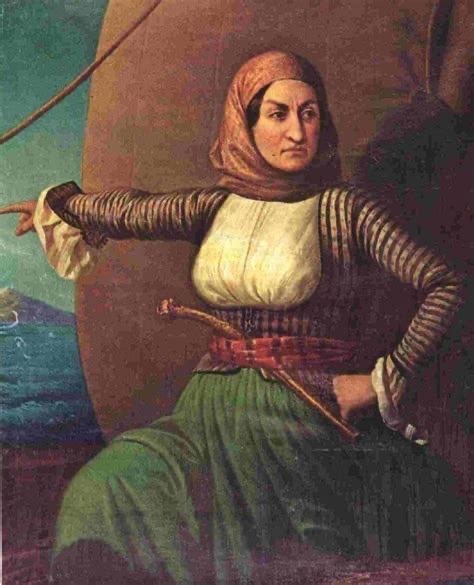
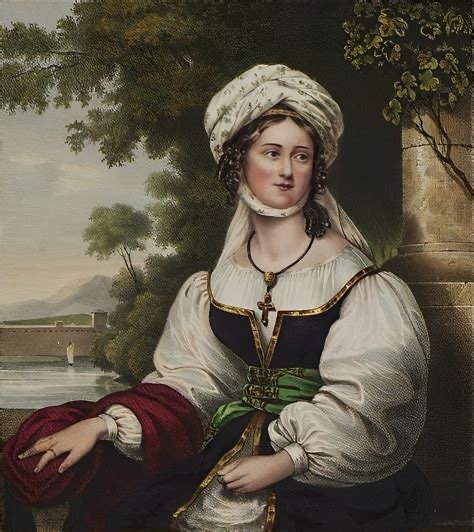
0 notes
Text
Laskarina Bouboulina
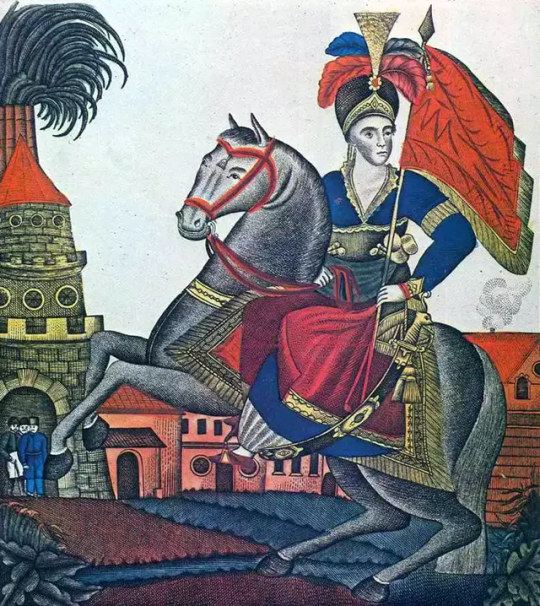
Laskarina Bouboulina · Admiralin und See-Kommandantin
Laskarina Bouboulina Pinotsis (Λασκαρίνα Μπουμπουλίνα Πινότση; 11. Mai 1771 - 22. Mai 1825) war eine griechische See-Kommandantin im Unabhängigkeitskrieg 1821 und die erste Frauenadmiralin der russischen Kaiserlichen Marine.
Bouboulina wurde in einem Gefängnis in Konstantinopel geboren. Sie stammte von der Insel Hydra. Sie war die Tochter von Stavrianos Pinotsis, einem Kapitän von der Insel Hydra, und seiner Frau Skevo.
Die Osmanen hatten Pinotsis für seine Rolle in der gescheiterten Orlof-Revolution von 1769–1770 gegen die osmanische Herrschaft inhaftiert. Bei einem Besuch ihrer Mutter wurde sie dort geboren. Ihr Vater starb kurz darauf und Mutter und Kind kehrten nach Hydra zurück. Sie zogen vier Jahre später auf die Insel Spetses, als ihre Mutter Dimitrios Lazarou-Orlof heiratete. Bouboulina hatte acht Halbgeschwister.
Sie heiratete zweimal, zuerst Dimitrios Yiannouzas und später den wohlhabenden Reeder und Kapitän Dimitrios Bouboulis, woher sie ihren bekannten Nachnamen hat. Bouboulis wurde 1811 im Kampf gegen die algerischen Piraten getötet. Die damals 40-jährige Bouboulina übernahm sodann sein Vermögen und sein Handelsgeschäft und ließ auf eigene Kosten vier weitere Schiffe bauen, darunter das große Kriegsschiff Agamemnon.
1816 versuchten die Osmanen, Bouboulinas Besitz zu konfiszieren, weil ihr zweiter Ehemann im letzten Krieg für die Russen gegen die Türken gekämpft hatte. Sie segelte nach Konstantinopel, um den russischen Botschafter Stroganov zu treffen und um seinen Schutz zu bitten.
In Anerkennung von Bouboulis Dienst an den Russen schickte Strogonov sie auf die Krim. Dort traf sie sich mit der Mutter von Mahmud II., die späteren Berichten zufolge ihren Sohn überzeugte, Bouboulinas Eigentum ihr wieder zu überlassen. Nach drei Monaten Verbannung auf der Krim kehrte Bouboulina nach Spetses zurück.
Angeblich trat Bouboulina der Untergrundorganiation Filiki Etaireia bei, die Griechenland auf die Revolution gegen die osmanische Herrschaft vorbereitete. Man behauptet, sie wäre eine der wenigen Frauen dieser Organisation gewesen. Bouboulina kaufte Waffen und Munition auf eigene Kosten und brachte diese heimlich auf ihre Schiffe, um, wie sie sagte: "meiner Nation willen" zu kämpfen.
Der Bau des Schiffes Agamemnon wurde im Jahr 1820 fertiggestellt. Sie bestach türkische Beamte, damit die Größe des Schiffes ignoriert wurde. Agamemnon war später eines der größten Kriegsschiffe in der Hand griechischer Rebellen. Sie organisierte auch ihre eigenen bewaffneten Truppen, die sich aus Männern von Spetses zusammensetzten. Dabei verbrauchte sie den größten Teil ihres Vermögens, um die Matrosen und Soldaten unter ihrem Kommando mit Essen und Munition zu versorgen.
Am 13. März 1821 hisste Bouboulina auf dem Mast von Agamemnon ihre eigene griechische Flagge, die auf der Flagge der byzantinischen Kaiser von Comnenus basiert. Das Volk von Spetses rebellierte sodann und schloss sich mit weiteren Schiffen aus anderen griechischen Inseln Bouboulina an. So segelte sie mit acht Schiffen nach Nafplion und begann eine Flottenblockade.
Später beteiligte sie sich an der Marineblockade und der Gefangennahme von Monemvasia und Pylos. Ihr Sohn Yiannis Yiannouzas starb im Mai 1821 in der Schlacht von Argos gegen die überlegennen osmanischen Truppen.
Bouboulina kam am 11. September 1821 in Tripolis an, als die Stadt fiel und traf sich mit General Theodoros Kolokotronis. Während der Niederlage der osmanischen Garnison rettete Bouboulina die meist weiblichen Mitglieder des Hauses des Sultans.
Als gegnerische griechische Parteien 1824 erneut einen Bürgerkrieg anfachten, verhaftete die neue griechische Regierung Bouboulina wegen ihrer Familienverbindung mit Kolokotronis, ihr Schwiegersohn wurde während der Ereignisse getötet. Schließlich wurde sie nach Spetses verbannt. Ihr gesamtes Vermögen für den Unabhängigkeitskrieg war mittlerweile erschöpft.
1825 wurde Laskarina Bouboulina infolge einer Familienfehde in Spetses getötet. Die Tochter einer Koutsis-Familie und Bouboulinas Sohn Georgios Yiannouzas waren entlassen worden. Auf der Suche nach seiner Tochter ging der Vater des Mädchens, Christodoulos Koutsis, mit bewaffneten Familienmitgliedern zu Bouboulinas Haus. Nach einem Streit mit Christodoulos Koutsis schoss jemand auf sie. Bouboulina wurde mitten in die Stirn getroffen und sofort getötet. Der Mörder wurde nie identifiziert.
Nach ihrem Tod gewährte Kaiser Alexander I. von Russland Bouboulina den Ehrenrang eines Admirals der russischen Marine und sie war damit bis vor kurzem die einzige Frau in der Geschichte der Weltmarine, die diesen Titel trug. Das Schiff Agamemnon wurde später an den griechischen Staat verkauft und in Spetsai umbenannt.
Auf der Insel Spetses befindet sich heute das "Bouboulina Museum" in dem 300 Jahre alten Herrenhaus von Bouboulinas zweitem Ehemann Bouboulis, in dem auch noch ihre Nachfahren leben. Eine Statue von ihr steht im Hafen von Spetses.
Zu ihren Ehren wurden auch verschiedene Straßen in ganz Griechenland und Zypern benannt, insbesondere die Bouboulina-Straße in der Nähe der Nationalen Technischen Universität von Athen (Polytechnion) und des Nationalen Archäologischen Museums von Athen, im Zentrum von Athen sowie in Piräus und in Nikosia.
Laskarina Bouboulina · Admiralin und See-Kommandantin · Person
Read the full article
0 notes
Text
"LASKARINA BOUBOULINA: HEROINE OF THE GREEK WAR OF INDEPENDENCE"/Balladeer's Blog
LASKARINA BOUBOULINA: HEROINE OF THE GREEK WAR OF INDEPENDENCE
View On WordPress
0 notes
